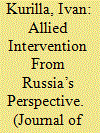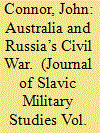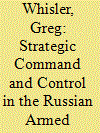| Srl | Item |
| 1 |
ID:
170495


|
|
|
|
|
| Summary/Abstract |
The narrative of the foreign intervention in the Russian Civil War changed its meaning for the Soviet and post-Soviet Russian scholars and ideologues several times. Stalin put all the blame for starting Civil War on the intervention, with emphasis on the British leading role. During Cold War, Soviet propagandists highlighted the role of the US Expeditionary forces. In the 1990s the lifting of ideological control permitted new research of the Civil War and intervention written from multiple points of view to emerge. However, after 2000 increasingly anti-revolutionary and anti-Western policies of the Russian government facilitated the return of the early Soviet narrative into semi-official interpretations: The West again was to blame for igniting the Russian Revolution and Civil War. Nevertheless, contemporary Russia provides professional historians relatively more freedom than the USSR did. They continue scholarly research leading to a better understanding the Russian Civil War and the complexity of the domestic and foreign forces’ motives and actions.
|
|
|
|
|
|
|
|
|
|
|
|
|
|
|
|
| 2 |
ID:
170492


|
|
|
| 3 |
ID:
170493


|
|
|
| 4 |
ID:
170497


|
|
|
| 5 |
ID:
170494


|
|
|
|
|
| Summary/Abstract |
Over 100 years ago Western nations intervened in Russia in support of White forces against the Bolsheviks and their revolution. Canada was one of those intervenors and was a major participant. Canada's intervention had a lasting effect on that nation and was the start of its international independence from Britain while remaining an integral part of, first, the British Empire, and later its successor, the British Commonwealth. This article discusses Canada's evolution to international player having established that nation's bonafides with its efforts in the Russian intervention of 1918-1920.
|
|
|
|
|
|
|
|
|
|
|
|
|
|
|
|
| 6 |
ID:
170491


|
|
|
|
|
| Summary/Abstract |
Britain's involvement in the Russian Civil War was an attempt by the greatest maritime power in the world to project power decisively against continental-power Russia; to overturn the Bolshevik Revolution and prevent the spread of communism across Europe. This article briefly examines the Royal Navy's Baltic Campaign during the pivotal year of 1919 and especially during October, with counter-revolutionary White General Nikolai Yudenich's final lunge towards Petrograd . Although the existing literature predominantly ascribes a great moral and strategic victory to modern naval deterrence -- the protection of the Baltic States on the one hand and against German-led forces on the other -- the historical evidence suggest a much more nuanced definition of 'victory'. British sea power was not able to destroy the Red Fleet anchored at Kronstadt, nor secure Yudenich's left flank by overpowering the outlying coastal fortress of Krasanaya Gorka. As a result, the entire White offensive was thrown off-balance and ultimately ill-fated.
|
|
|
|
|
|
|
|
|
|
|
|
|
|
|
|
| 7 |
ID:
170488


|
|
|
|
|
| Summary/Abstract |
In the late autumn of 1877 it seemed that the Russo-Turkish War had entered a stalemate: The Russian Army still stayed to the north of the Balkan Ridge, which was deemed to be impassable until spring. However, bold initiative backed by a series of thoughtful improvisations allowed the Russians to outmaneuver the Ottomans and cross the ridge. The numerous non-combat injuries sustained during this march were a fair price for the strategic surprise that paved the way to a total victory. In this case, the improvised approach to mountain warfare paid off, but the attempts to bet on improvisations in subsequent campaigns on a less forgiving mountainous terrain or against an enemy experienced in mountain warfare were to fail.
|
|
|
|
|
|
|
|
|
|
|
|
|
|
|
|
| 8 |
ID:
170496


|
|
|
|
|
| Summary/Abstract |
The aim of this article is to explain the logiс of the main operations of the Second World War in terms of the Allied strategy that was created and constantly updated in the light of the changing situation at the various fronts at the regular Allied summits. Such a ‘grand strategy’ is also the key to understand most of the problems of the history of warfare, such as the ‘problem of the second front’, the refusal to use chemical weapons, or the adoption of the Lend-Lease Act, as well as changes in the concepts of its implementation during the war, starting from the ‘concept of proxy war’ to the ‘concept of pool’ and ‘globalization’. The understanding of the Allied strategy, as well as the Lend-Lease concept, allows for an analysis of the role of the Northern Convoys in the Second World War, not only as the route for strategic supplies a but also as an important actor of one of the main naval theaters of the Second World War.
|
|
|
|
|
|
|
|
|
|
|
|
|
|
|
|
| 9 |
ID:
170490


|
|
|
|
|
| Summary/Abstract |
To mark the hundredth anniversary of the often misunderstood Allied intervention in Russia’s Civil War, The Journal of Slavic Military Studies has dedicated a section of this volume to assessing the impact of that convoluted operation. Lincoln Flake, a book review editor for the journal, introduces the topic. He is followed by contributions from five leading scholars from combatant nations. They provide unique insights into the desperate operations that occurred across Russia a century ago and the political and social consequences that followed.
|
|
|
|
|
|
|
|
|
|
|
|
|
|
|
|
| 10 |
ID:
170487


|
|
|
|
|
| Summary/Abstract |
Information warfare was not invented by Vladimir Putin, but draws on Soviet information and disinformation campaigns. This article adds to the scholarly literature by showing the links between Tsarist, Soviet, and Russian narratives in Moscow’s contemporary information warfare. Messages in Russia’s information warfare are not only traditionally Soviet; they are also Tsarist when referring to Ukrainians. A second addition to the literature analyzes why Russia’s ‘Chekist’ counterintelligence state places Ukraine and Ukrainians at the forefront of Moscow’s information warfare.
|
|
|
|
|
|
|
|
|
|
|
|
|
|
|
|
| 11 |
ID:
170489


|
|
|
|
|
| Summary/Abstract |
Large rivers and lakes have served as major arteries of industry and commerce, defensive barriers, lines of communication, and avenues of advance. These bodies of water have been and are prime factors in European warfare. Armies are more accustomed to solving the problem of crossing rivers rather than controlling stretches or the entirety of the river or lake. Yet control of the river or lake can be more decisive to a campaign than a crossing. Large rivers rise also to the level of a naval problem. Armies should interact closely with brown-water or green-water navies as they attempt to control the important inland waterways. There are almost no contemporary studies that illuminate this important operational environment in the European theater. However, the Soviet experience in WWII does offer a rich examination and one that offers lessons for consideration today. This study examines the interactions of the Soviet Dniepr River Flotilla and Red Army during Operation Bagration in World War II and draws applicable lessons for the present. The lessons of this campaign are still studied in Russian military academies and colleges and are applied in active training today.
|
|
|
|
|
|
|
|
|
|
|
|
|
|
|
|
| 12 |
ID:
170486


|
|
|
|
|
| Summary/Abstract |
This article is the first in a series of three that examines the Russian Armed Forces’ efforts to adjust their strategic command and control architecture in the post-Soviet period, taking into account wide-ranging shifts in force structure, missions, geography, resources, and leadership. From 1996 to 2000, changes reflected Russian military reform more broadly: much conceptualization, but little implementation. In the first four years of Putin’s presidency, the military leadership advocated strategic command and control reforms, but remained focused on more fundamental issues of military readiness, service conditions, and downsizing. More wide-ranging changes began in earnest in the mid-2000s, only to be overtaken by an even more fundamental defense reform process initiated in 2007. The process of changing the strategic C2 system captured many political, cultural, and strategic facets of post-Soviet Russian military development.
|
|
|
|
|
|
|
|
|
|
|
|
|
|
|
|